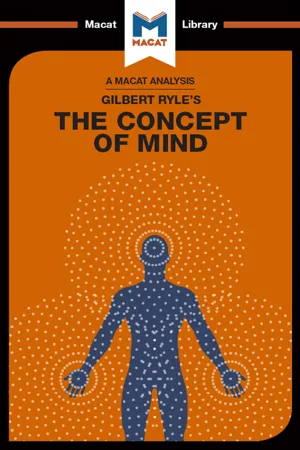
- 101 pages
- English
- ePUB (mobile friendly)
- Available on iOS & Android
An Analysis of Gilbert Ryle's The Concept of Mind
About this book
Gilbert Ryle's 1949 The Concept of Mind is now famous above all as the origin of the phrase "the ghost in the machine" – a phrase Ryle used to attack the popular idea that our bodies and minds are separate. His own position was that mental acts are not at all distinct from bodily actions. Indeed, they are the same thing, merely described in different ways – and if one cuts through the confusing language of the old philosophical debates, he suggests, that becomes clear. While, in many ways, modern philosophers of mind have moved on from or discarded Ryle's actual arguments, The Concept of Mind remains a classic example of two central critical thinking skills: interpretation and reasoning. Ryle was what is known as an "ordinary language" philosopher – a school who considered many philosophical problems to exist purely because of philosophical language. He therefore considered his task as a philosopher to be one of cutting through confusing language, and clarifying matters – exemplifying the critical thinking skill of interpretation at its best. Rather than adding to philosophical knowledge as such, moreover, he saw his role as one of mapping it – giving it what he called a "logical geography." As such, The Concept of Mind is also all about reasoning: laying out, organizing, and systematizing clear arguments.
Frequently asked questions
- Essential is ideal for learners and professionals who enjoy exploring a wide range of subjects. Access the Essential Library with 800,000+ trusted titles and best-sellers across business, personal growth, and the humanities. Includes unlimited reading time and Standard Read Aloud voice.
- Complete: Perfect for advanced learners and researchers needing full, unrestricted access. Unlock 1.4M+ books across hundreds of subjects, including academic and specialized titles. The Complete Plan also includes advanced features like Premium Read Aloud and Research Assistant.
Please note we cannot support devices running on iOS 13 and Android 7 or earlier. Learn more about using the app.
Information
Table of contents
- Cover
- Title Page
- Copyright Page
- Table of Contents
- WAYS IN TO THE TEXT
- Who Was Gilbert Ryle?
- What Does The Concept of Mind Say?
- Why Does The Concept of Mind Matter?
- SECTION 1: INFLUENCES
- Module 1: The Author and the Historical Context
- Module 2: Academic Context
- Module 3: The Problem
- Module 4: The Author’s Contribution
- SECTION 2: IDEAS
- Module 5: Main Ideas
- Module 6: Secondary Ideas
- Module 7:Achievement
- Module 8: Place in the Author’s Work
- SECTION 3: IMPACT
- Module 9: The First Responses
- Module 10: The Evolving Debate
- Module 11: Impact and Influence Today
- Module 12: Where Next?
- Glossary of Terms
- People Mentioned in the Text
- Works Cited